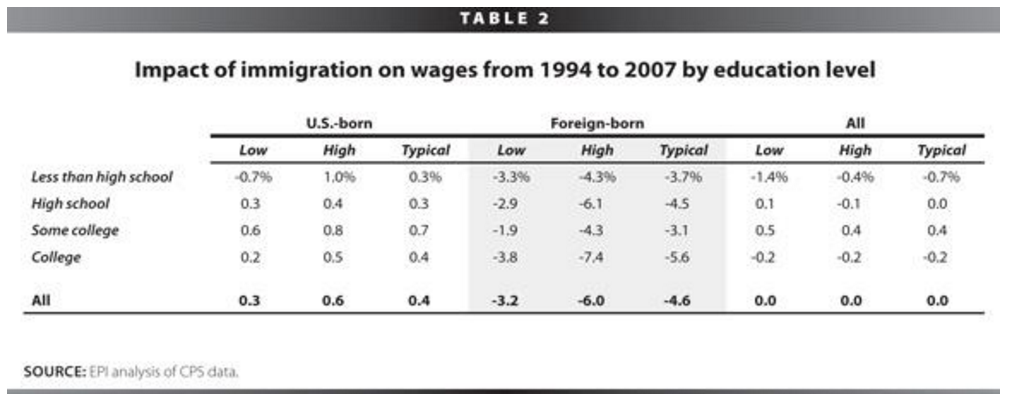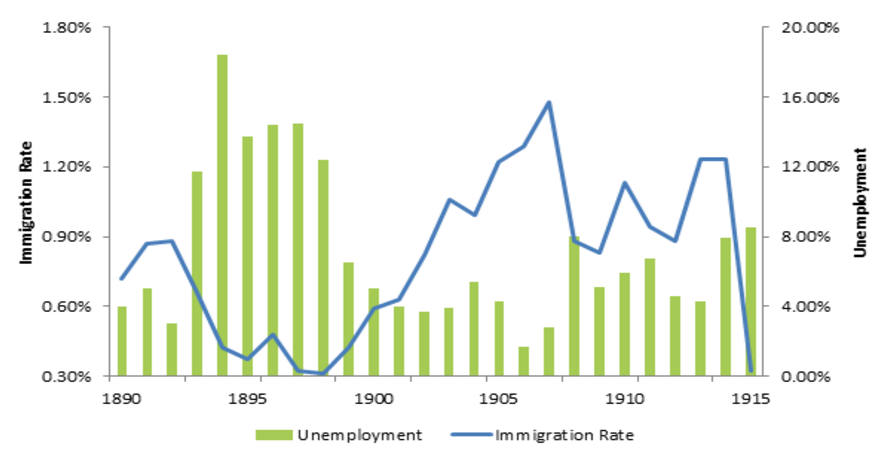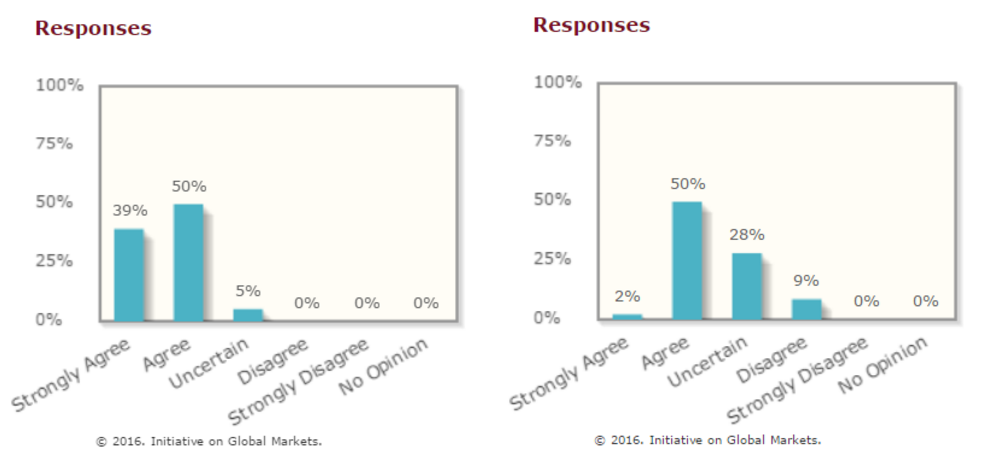By Pete Scharf
“Decades of record immigration have produced lower wages and higher unemployment for our citizens. We are going to have an immigration system that works, but one that works for the American people.” - Donald Trump, RNC acceptance speech[1]Throughout his presidential campaign, Republican nominee Donald Trump has accused immigrants of bringing crime, suppressing wages, and abusing our welfare system. In Europe, the fear of immigration’s negative consequences has propelled far right anti-immigration parties to victory in Switzerland[2], France[3], and Poland[4], among others, and indeed was the main contributor to the UK’s decision to leave the European Union. The perceived negative economic impacts are keeping even more left-leaning politicians like Bernie Sanders skeptical of immigration.[5] Although there may be some legitimate arguments against immigration from a national security standpoint, the economic argument is strongly in favor. Immigration, for the most part, does not depress wages, hamper growth, or create unemployment. Instead, immigration is a sign of a healthy economy and is a benefit both to the immigrants seeking a better life and to the native worker.The idea of wage suppression is a common argument against increased immigration. The Trump campaign claims their restrictive immigration policy will boost native wages, and the argument goes like this: immigration shifts the labor supply curve to the right, which leads to a drop in equilibrium price of labor, leaving all workers with lower wages. This line of reasoning, however, entirely ignores the demand-side effects of immigration. Immigrants who come here to make money also go out and spend it, thus creating demand and often more than offsetting the increase in supply. Foged and Peri (2013) studied the wage of unskilled Danish workers and found that increases in the labor force caused by immigration actually raised the wages of unskilled native workers.[6] Similar studies have found small positive results on native wages with at most minor negative changes to unskilled workers. As shown in the table below, a study by the Economic Policy Institute found the only decrease in wages occurred for foreign workers who had to compete directly with new immigrants. Native workers’ wages remained nearly unchanged, and at times enjoyed small positive effects.[7] Negative wage impacts primarily occur for foreign born workers who directly compete against newer immigrants. U.S.-born workers’ wages remained almost unchanged with slight positive effects.[7]A second malady blamed on immigrants is unemployment. Critics argue that immigrants coming into the country compete for jobs U.S. workers currently hold, and are willing to take them at lower wages, leading to unemployment among native workers. Empirically, however, this has simply not been the case. Islam (2013) found no effect of immigration on unemployment.[8] In fact, the opposite was true: lower unemployment increased immigration. A lower unemployment rate was a signal of a healthy labor market that would attract immigrants. In times of high unemployment, immigration waned only to pick back up again when the labor market turned around.
Negative wage impacts primarily occur for foreign born workers who directly compete against newer immigrants. U.S.-born workers’ wages remained almost unchanged with slight positive effects.[7]A second malady blamed on immigrants is unemployment. Critics argue that immigrants coming into the country compete for jobs U.S. workers currently hold, and are willing to take them at lower wages, leading to unemployment among native workers. Empirically, however, this has simply not been the case. Islam (2013) found no effect of immigration on unemployment.[8] In fact, the opposite was true: lower unemployment increased immigration. A lower unemployment rate was a signal of a healthy labor market that would attract immigrants. In times of high unemployment, immigration waned only to pick back up again when the labor market turned around. Immigration and unemployment during a period of heavy immigration (1890-1915). The drop in immigration in 1914 is attributed to World War I.[9]Lastly, many assume immigration has a negative impact on the welfare programs in the United States. They claim immigrants utilize our public assistance programs without contributing equal amounts in taxes, which either raises taxes on U.S. citizens or causes the financial ruin of these programs. In reality, the federal government does not allow this to occur: “With many important exceptions, Qualified Aliens are ineligible for the Supplemental Nutrition Assistance Program (SNAP formerly the Food Stamp Program) and SSI. States have the authority to determine their eligibility for TANF, SSBG, and Medicaid. With some exceptions, Qualified Aliens entering the country after August 22, 1996, are denied Federal means-tested public benefits for their first five years in the U.S. as qualified aliens.”[10] A Harvard study looking at Medicare, a program immigrants can utilize under certain circumstances, found “immigrants made 14.7 percent of Trust Fund contributions but accounted for only 7.9 percent of its expenditures—a net surplus of $13.8 billion. In contrast, US-born people generated a $30.9 billion deficit.”[11] The policy and the research suggest that if anything, immigrants put more into welfare programs than they take out.While immigrants are a source of cash flows to the federal government, they may constitute a fiscal burden for state and local governments. This is primarily because immigrants are poorer on average than U.S.-born taxpayers, and thus foot a smaller tax bill. A National Research Council study concluded that although immigrants are a fiscal positive to the federal government of about $105,000 over the course of their lifetime, they are a fiscal negative for state governments to the tune of $25,000.[12] However, the loss by state governments could be completely eliminated by the immigrants’ positive macroeconomic impact.The research is clear: the benefits of immigration greatly outweigh its small risks and miniscule negative consequences. Politicians often wrongfully paint immigrants as leeches wishing to enter our country to steal our jobs, lower our wages, and drain our welfare resources; these claims run counter to most economic evidence. We need to support candidates and policies that further liberalize immigration, not hamper it. When an immigrant comes to the United States, they not only better their own life, but the lives of their American neighbors.The Experts Agree
Immigration and unemployment during a period of heavy immigration (1890-1915). The drop in immigration in 1914 is attributed to World War I.[9]Lastly, many assume immigration has a negative impact on the welfare programs in the United States. They claim immigrants utilize our public assistance programs without contributing equal amounts in taxes, which either raises taxes on U.S. citizens or causes the financial ruin of these programs. In reality, the federal government does not allow this to occur: “With many important exceptions, Qualified Aliens are ineligible for the Supplemental Nutrition Assistance Program (SNAP formerly the Food Stamp Program) and SSI. States have the authority to determine their eligibility for TANF, SSBG, and Medicaid. With some exceptions, Qualified Aliens entering the country after August 22, 1996, are denied Federal means-tested public benefits for their first five years in the U.S. as qualified aliens.”[10] A Harvard study looking at Medicare, a program immigrants can utilize under certain circumstances, found “immigrants made 14.7 percent of Trust Fund contributions but accounted for only 7.9 percent of its expenditures—a net surplus of $13.8 billion. In contrast, US-born people generated a $30.9 billion deficit.”[11] The policy and the research suggest that if anything, immigrants put more into welfare programs than they take out.While immigrants are a source of cash flows to the federal government, they may constitute a fiscal burden for state and local governments. This is primarily because immigrants are poorer on average than U.S.-born taxpayers, and thus foot a smaller tax bill. A National Research Council study concluded that although immigrants are a fiscal positive to the federal government of about $105,000 over the course of their lifetime, they are a fiscal negative for state governments to the tune of $25,000.[12] However, the loss by state governments could be completely eliminated by the immigrants’ positive macroeconomic impact.The research is clear: the benefits of immigration greatly outweigh its small risks and miniscule negative consequences. Politicians often wrongfully paint immigrants as leeches wishing to enter our country to steal our jobs, lower our wages, and drain our welfare resources; these claims run counter to most economic evidence. We need to support candidates and policies that further liberalize immigration, not hamper it. When an immigrant comes to the United States, they not only better their own life, but the lives of their American neighbors.The Experts Agree Courtesy of the IGM Economic Experts Panel.Left Chart: “The average U.S. citizen would be better off if a larger number of highly educated foreign workers were legally allowed to immigrate to the U.S. each year.”[14]Right Chart: “The average U.S. citizen would be better off if a larger number of low-skilled foreign workers were legally allowed to enter the U.S. each year.”[13]Further Reading:Trillion-Dollar Bills on the SidewalkThe Case for Open BordersTen Economic Facts About Immigration16 Reasons Why Opening Our Borders Makes More Sense Than Militarizing Them
Courtesy of the IGM Economic Experts Panel.Left Chart: “The average U.S. citizen would be better off if a larger number of highly educated foreign workers were legally allowed to immigrate to the U.S. each year.”[14]Right Chart: “The average U.S. citizen would be better off if a larger number of low-skilled foreign workers were legally allowed to enter the U.S. each year.”[13]Further Reading:Trillion-Dollar Bills on the SidewalkThe Case for Open BordersTen Economic Facts About Immigration16 Reasons Why Opening Our Borders Makes More Sense Than Militarizing Them
- Staff, P. (16, July 21). Full text: Donald Trump 2016 RNC draft speech transcript. http://www.politico.com/story/2016/07/full-transcript-donald-trump-nomination-acceptance-speech-at-rnc-225974
- R. (2015, October 19). Anti-immigration party wins Swiss election in 'slide to the Right' http://www.telegraph.co.uk/news/worldnews/europe/switzerland/11939953/Anti-immigration-party-wins-Swiss-election-in-slide-to-the-Right.html
- France's National Front Claims Record-Breaking Victory. (2015, December 10). https://www.thetrumpet.com/article/13353.18.0.0/economy/frances-national-front-claims-record-breaking-victory
- Smith, L. (2016, January 13). The rise of the far-right in Poland: No more Eurovision, vegetarians or cyclists. http://www.ibtimes.co.uk/rise-far-right-poland-no-more-eurovision-vegetarians-cyclists-1537735
- Lerner, K. (2015, July 30). Why Immigration Is The Hole In Bernie Sanders' Progressive Agenda. https://thinkprogress.org/why-immigration-is-the-hole-in-bernie-sanders-progressive-agenda-604e5ce56e9f#.wblnhb8b1
- Foged, M., & Peri, G. (2013). Immigrants' and Native Workers: New Analysis on Longitudinal Data.
- Shierholz, H. (2010, February 4). Immigration and Wages: Methodological advancements confirm modest gains for native workers. http://www.epi.org/publication/bp255/
- Islam, A. (2007). Immigration Unemployment Relationship: The Evidence From Canada. Australian Economic Papers Aust Econ Papers, 46(1).
- Bier, D. (2016, July 26). Why Unemployment Is Lower When Immigration Is Higher
- Summary of Immigrant Eligibility Restrictions Under Current Law. (2009, February 25). https://aspe.hhs.gov/basic-report/summary-immigrant-eligibility-restrictions-under-current-law
- Zallman, L., Woolhandler, S., Himmelstein, D., Bor, D., & Mccormick, D. (2013). Immigrants Contributed An Estimated $115.2 Billion More To The Medicare Trust Fund Than They Took Out In 2002-09. Health Affairs, 32(6), 1153-1160.
- Griswold, D. (2012). Immigration and the Welfare State. Cato Journal, 32(1), 159-174
- High-Skilled Immigrants. (2013, February 12). http://www.igmchicago.org/igm-economic-experts-panel/poll-results?SurveyID=SV_0JtSLKwzqNSfrAF
- Low Skill Immigrants. (2013, December 10). http://www.igmchicago.org/igm-economic-experts-panel/poll-results?SurveyID=SV_5vuNnqkBeAMAfHv


